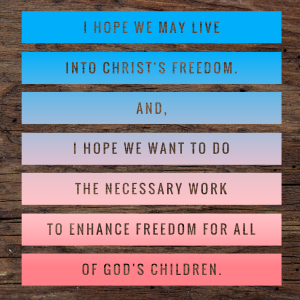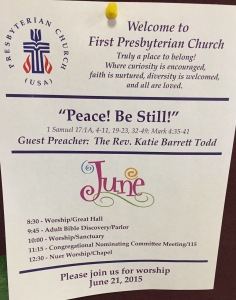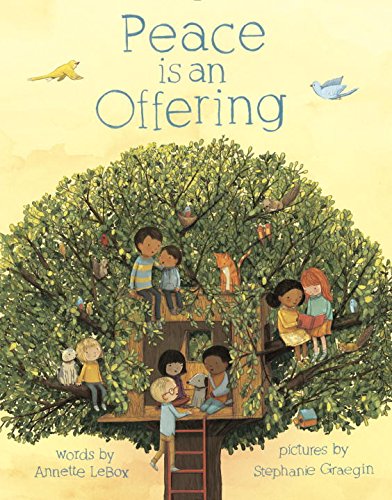
Scriptures:
Galatians 5:1, 13-25
Luke 9:51-62
A recording is available here.
Just a few short weeks ago I had the privilege of visiting Mount Rushmore with my family. I’d never been to Mount Rushmore before and was told the lighting ceremony was something not-to-be-missed, so we arranged our plans for the kids and I to experience our first-ever visit just as the evening event started.
If you’ve not been for the lighting, I commend it to you.
The evening starts with a twenty-minute video sharing the history of the leaders depicted on the mountainside, and it includes the lighting as well as the flag retreat for the night.
The auditorium was brimming with people, nearly every seat filled, and yet it was silent enough to hear an owl hoot somewhere off in the distance of the park forest. I noticed the owl making noise and started relishing the night views of the natural surroundings to the human-created auditorium structure, and I lost track of the video somewhere around the closing remarks on George Washington.
But then I heard words that I’ve just not been able to shake. These words are so very familiar to us. They’ve been seared into our brains through history classes and even radio commercials as we approach our Independence Day tomorrow. I heard the words that Thomas Jefferson penned on July 2, 1776 that were adopted on July 4, 1776, The opening words to the Declaration of Independence:
We hold these truths to be self-evident, that all men are created equal, that they are endowed by their Creator with certain unalienable Rights, that among these are Life, Liberty and the pursuit of Happiness.
The Declaration of Independence was the moment when we as Americans decided we wanted our freedom from Great Britain. Our Founding Fathers sought to break away from the fiscal, political and religious repression of their country of origin. They wanted freedom in their new land – our homeland. The words that Thomas Jefferson penned, particularly this opening statement, have long been considered a statement on human rights, those moral principles or norms, which describe certain standards of human behavior, and are regularly protected as legal rights.
Freedom.
Jesus is about to be “free” of his earthly body in today’s Luke text. The narrative begins with a reference to Jesus’ future ascension into heaven, readying the disciples for their ultimate mission following Pentecost. When Jesus departs, the disciples continue his ministry of bringing about freedom to all the world. They are hesitant. They are unprepared to be the leaders Christ has been training. The disciples don’t know how to respond when challenged.
“Temptations around the use of power will face the disciples in the future…The disciples have already been told that when they are rejected, they are simply to shake the dust from their feed and announce that the kingdom of God has come near. Retaliation of any kind is not an option for disciples.”[1]
Judgment belongs to God alone.
Retaliation is unacceptable.
Persecution eliminates freedom.
Jesus Christ rebukes his disciples for defaulting on vengeance and anger toward those who reject them or Christ. They will be rejected, we will be rejected, but in those instances we must offer grace over rage. The life of Jesus Christ models choosing not to punish those reluctant to support him, and instead inviting believers to journey alongside him. The disciples are instructed to keep focus on the mission by looking and pressing forward.
Following Christ, a life of freedom in Christ, is not easy. Proclaiming “I will follow you wherever you go” has major life implications – God’s call on our lives means that other loyalties are no longer first. A life of freedom in Jesus Christ means that family, community, tradition, and the like are no longer our top priority. God must come first, and from that everything else will flow…we will be free.
In his letter to the Galatians, Paul introduces a gospel claim and a missional cause[2] in his opening to the fifth chapter: Christ has set us free, so our lives and actions are to reveal that freedom. Jesus Christ preached freedom, lived freedom, and offered freedom to all. We have the opportunity to live into the freedom of Jesus Christ, and also the responsibility to work toward ensuring others live into their God-given freedom, as well.
“We hold these truths to be self-evident, that all… are created equal, that they are endowed by their Creator with certain unalienable Rights…”[3]
We need the courage to live into it.
Freedom is NOT the absence of encumbrances. “Entanglements are the means by which freedom becomes meaningful.”[4]
Holocaust survivor and Nobel Laureate Elie Wiesel may have been free from concentration camps, but he was not without burden. In his landmark story of the Holocaust, Night, he penned:
“Never shall I forget that night, the first night in camp, which has turned my life into long night, seven times cursed and seven times sealed …,” Wiesel wrote. “Never shall I forget those flames that consumed my faith forever. Never shall I forget that nocturnal silence which deprived me, for all eternity, of the desire to live.”[5]
Although he survived the camps, and was technically free, liberated from imprisonment, Wiesel did not live a life of freedom. Any life where there is an experience which deprives an individual of a desire to live is not a life of freedom. Until he passed away this week, Elie Wiesel was in bondage to the memories of his time in hell on earth.
Paul tells the Galatians in verse 13 that freedom means love: “For you were called to freedom…only do not use your freedom as an opportunity for self-indulgence, but through love become slaves to one another.” Loving your neighbor as yourself seems an easy thing to do, except we must first learn to love ourselves. But, what does that mean? It means recognizing our sacred inner beauty given by our Creator and recognizing that also others possess a sacred inner beauty. Our call to freedom to love yourself and others is a call to receive from Christ first and offer to our neighbors with the very same receptive heart.
When Paul speaks about the spirit versus the flesh or the law, he’s showing us an alternative director for our lives. Allowing the Spirit of Freedom to guide our decision making doesn’t mean disobeying local laws, it means that we get to claim our identity as Children of God. Declaring this identity grants us chance to love others more than ourselves, and to work for their equality as God’s children.
Recognizing the sacredness of all of God’s children, Wiesel chose to speak out and become an activist. His stage was international, where he worked, to ensure that victims received freedom, in spite of his own long night imprisonment. In his 1986 Nobel Peace Prize acceptance speech Wiesel stated:
“We must always take sides. Neutrality helps the oppressor, never the victim. Silence encourages the tormentor, never the tormented. Sometimes we must interfere,” he said. “When human lives are endangered, when human dignity is in jeopardy, national borders and sensitivities become irrelevant. Wherever men or women are persecuted because of their race, religion, or political views, that place must—at that moment—become the center of the universe.”[6]
Freedom is not separation from relationships, rather it is a feature of relationships that becomes apparent as a result of our relationships with Jesus Christ. When we acknowledge our relationship with God by our very nature as the created of the Creator, and when we long to serve and be in relationship with Jesus Christ, we must ask the Holy Spirit to strengthen our relations with our neighbors and strangers. We are free when we give and receive love.
When we cast aside the desires of our flesh and impulse reactions to rejection in order to seek a life of Christ-like love, we become free ourselves to offer freedom beyond ourselves. Freely accepting God’s Spirit as the guide of our lives produces new fruit. Our lives change when we live into the freedom of God; we don’t have to work at being kind, it just comes effortlessly. The Spirit brings new motivations to our heart and we bear joy, peace, patience, kindness, goodness, faithfulness, gentleness, and self-control as it’s result. We don’t even have to strain because it’s natural. That’s real freedom.
And,
Freedom is the presence of hope.
Dum Spiro Spero means While I breathe, I hope. The Provincial Congress of South Carolina adopted these words as the state motto in March 1776. In the year of Independence, the forefathers chose words of hope as their guide. A state ripe with controversy – secession, slavery, war, segregation, poverty, and racial issues – still resides in hope for the future.
I want to live in a world where hope prevails, because hope means there is care and concern for something beyond the current and present. I want us to anticipate a better tomorrow. Freedom demands we have great expectations.
While I breathe, I hope:
I hope that I can be a faithful follower of Jesus Christ.
I hope to help my children know the depth of love God has for them.
I hope to adequately demonstrate what God expects of the beloved.
I hope I will display God to all whom I meet.
I hope to be courageous.
I hope I can forgive.
I hope I may love.
I hope everyone will experience equality.
I hope we’ll stop harming one another.
I hope that children will go to bed with full tummies.
I hope our veterans will receive the medical care they need.
I hope the Spirit will bend my will to match God’s will for me.
I hope that I can be kind.
I hope I will speak up for those who can’t speak for themselves.
I hope to not hate.
I hope I live spreading joy.
I hope I care for our planet well.
I hope I will give back.
I hope I’m a strong leader.
I hope to welcome the stranger.
I hope I’m not selfish.
I hope I’ll one day pray without ceasing.
I hope I will never stop learning.
I hope to experience and respect other cultures.
I hope I exhibit empathy.
I hope for the day disparaging words no longer exist.
I hope we’ll stop oppressing one another.
I hope God will work through us.
I hope God will work in spite of us.
I hope we won’t be silent when we shouldn’t be.
I hope the world will experience peace…one day.
I hope we can look at people’s hearts rather than their skin.
I hope we will forget about gender and just love.
I hope that when we face evil, we will summon capacity for good.
I hope we all will act rather than just speak.
I hope we quit forgetting injustice.
I hope the world stops betraying her people.
I hope our focus becomes on the laughter of children.
I hope we create hope.
I hope we encourage compassion.
I hope we learn to show grace.
…I could go on…
While I breathe, I hope we may live into Christ’s freedom.
And, I hope we want to do the necessary work to enhance freedom for all of God’s children.
Jesus tells his new followers that they must choose when they say they want to follow him. We can’t live both in the current and also in the future Christ gives us. We must make the decision that will bring us life, love, and freedom. It’s a hard choice to make! It may mean leaving behind family, jobs, friends, or homes. It may be lonely, we may face betrayal, and we may suffer, but Jesus doesn’t promise us an easy life, he promises us a free life.
Church, as we leave from this place celebrating our independence and national pride with cookouts, fireworks, parades, pool parties, and wearing our red, white and blue, I encourage us to consider how we define liberty. “Discerning what God has done in Christ and what Christ has done for us shapes the way we love our neighbors, and loving our neighbors helps us to see what God has done.”[7]
Freedom requires us to live so that all may be free. Christ’s freedom is not for one person, but for every person. We must go today into the world and fight for another. We need to let the world taste the unending love of Christ through loving your neighbor. Our missional cause begins with letting the Spirit change our motivations. We are called to live free, and labor for the freedom of others.
Let mercy flow.
Let compassion prevail.
Let hope abide.
Let freedom ring.
Amen.
[1] Elaine A. Heath, Theological Perspective on Luke 9:51-62 in Feasting on the Word: Year C, Volume 3, page 192.
[2] Mark Douglas, Theological Perspective on Galatians 5:1, 13-25 in Feasting on the Word: Year C, Volume 3, page 184.
[3] Declaration of Independence, 1776.
[4] Douglas, 184.
[5] http://www.huffingtonpost.com/entry/elie-wiesel-dead_us_57781653e4b0a629c1aa51bb
[6] http://www.theatlantic.com/news/archive/2016/07/remembering-elie-wiesel/489905/
[7] Douglas, 188.



